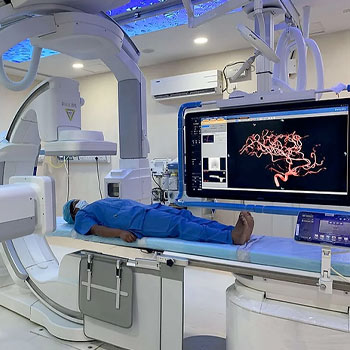What is Interventional Neurology?
Interventional neurology represents a cutting-edge field at the intersection of neurology and minimally invasive procedures. It focuses on advanced techniques to diagnose and treat conditions affecting the brain, spine, and nervous system using catheters, imaging guidance, and innovative technologies.
What is the role of interventional neurology?
Interventional neurology plays a crucial role in treating a wide range of neurological conditions that traditionally required open surgery. Neurologists specializing in this field utilize minimally invasive procedures to access affected areas of the brain or spine, thereby reducing risks, complications, and recovery times for patients.
What conditions are treated by interventional neurology?
Interventional neurology is instrumental in managing conditions such as
Stroke
Rapid intervention through procedures like thrombectomy can restore blood flow to the brain, minimizing long-term damage.
Aneurysms and Arteriovenous Malformations
Using techniques like coiling and embolization, neurologists can treat abnormal blood vessels in the brain without surgery.
Brain Tumors
In some cases, minimally invasive techniques can aid in the diagnosis and treatment of brain tumors, offering patients less invasive alternatives to traditional surgery.
Spinal Conditions
Conditions like spinal stenosis or herniated discs can often be treated using techniques such as epidural steroid injections or spinal cord stimulation
Key Techniques in Interventional Neurology
Interventional neurology employs several key techniques, including
Endovascular Procedures
Using catheters inserted through blood vessels, neurologists can deliver treatments directly to the site of the problem, such as delivering clot-busting medications during a stroke
Minimally Invasive Surgery
Procedures such as lumbar puncture or nerve blocks are performed using small incisions, reducing recovery times and minimizing complications
Neuroimaging
Advanced imaging technologies like MRI and CT scans are crucial in guiding procedures and assessing treatment outcomes
Benefits of Interventional Neurology
The primary advantages of interventional neurology include
- Reduced Risk: Minimally invasive techniques lower the risks associated with traditional open surgery, such as infection and prolonged recovery times.
- Faster Recovery: Patients typically experience shorter hospital stays and quicker recovery periods compared to traditional surgical methods.
- Precision and Accuracy: With the aid of sophisticated imaging techniques, neurologists can precisely target affected areas, improving treatment outcomes.
What is the role of interventional neurologists?
Interventional neurologists are highly trained specialists who collaborate closely with other healthcare professionals, including neurosurgeons, radiologists, and critical care specialists. They undergo extensive training in both neurology and interventional techniques to provide comprehensive care to patients with complex neurological conditions.
Interventional neurology represents a significant advancement in the field of neurology, offering patients minimally invasive alternatives to traditional surgical treatments. By harnessing the power of advanced imaging and innovative techniques, interventional neurologists can diagnose and treat a wide range of neurological disorders with precision and efficiency. As the field continues to evolve, the prospects for improving patient outcomes and quality of life are promising, making interventional neurology a critical component of modern neurological care.
For individuals facing neurological challenges, consulting with a qualified interventional neurologist can provide insights into personalized treatment options tailored to their specific condition and needs.

